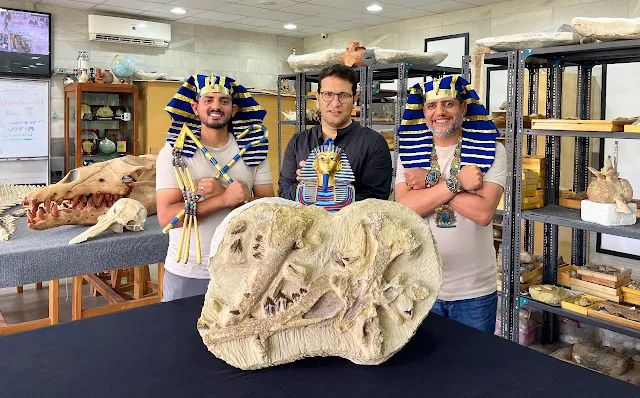A pint-size whale that lived around 41m years ago has been discovered by palaeontologists in Egypt, who say the species may have lived a short, speedy life.
Researchers say they unearthed the fossils near Wadi el-Hitan in Egypt, a site where many fossils of ancient whales can be found. At first, they said, it was unclear what they had found.
Prof Hesham Sallam, founder of the Mansoura University vertebrate palaeontology centre (MUVP), said the team initially found a single exposed tooth in a block of limestone that dated back to the Eocene, a period that lasted from about 55.8m to 33.9m years ago.
“Then when we were trying to repair it and clean up all of the sediment above the fossils, we discovered it is not something we usually see from that time period,” he said.
The whale has been named Tutcetus rayanensis, after the Egyptian pharaoh Tutankhamun, commemorating the discovery of the pharaoh’s tomb a century ago and the Wadi el-Rayan area in Egypt where the fossil was found.
According to Sallam’s team, the creature is a type of whale known as a basilosaurid – an extinct group thought to be the first whales to live solely in the water, unlike other early whales that also ventured on to land.
“[Tutcetus] is actually having very primitive features for the group that’s already known from Wadi el-Hitan,” they said. “It’s clear it’s a new genus and species. It also ended up being the oldest one [recorded], in Africa, for a fully aquatic whale.”
The team estimated the tiny whale weighed 187kg (400lb), and was about 2.5 meters (8ft) long, making it the smallest member of the basilosauridae, which usually measure between 4 metres and 20 metres long.
The researchers said an analysis of the soft enamel of the whale’s teeth revealed it would have fed on small squids and maybe crustaceans. MUVP’s Abdullah Gohar, a co-author of the study, noted that such a diet was similar to that of modern dolphins.
The team added that their study of the whale’s teeth and bones suggested it was approaching full adulthood when it died, while the rapid way in which the teeth developed and the small size of Tutcetus suggest that it had a short, fast life compared with larger and later basilosaurids.
The find comes just weeks after fossil hunters revealed the discovery of an ancient whale thought to be heaviest animal ever to have lived. That whale was also a basilosaurid.
Olivier Lambert, a palaeontologist at the Royal Belgian Institute of Natural Science, who was part of that study but was not involved in the new work, said the diminutive whale illustrated the impressive geographical spread of basilosaurids during the middle Eocene.
“Such a diversity and morphological disparity may also tell us about the replacement of the last four-legged, amphibious cetaceans by these first fully aquatic whales,” he said.
source :theguardian

